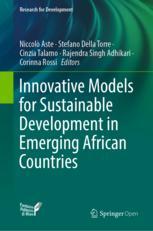How OA books are supporting the SDGs: An interview with Professor Stefano Della Torre
Open access (OA) advances research on the UN’s Sustainable Development Goals - as OA easily connects researchers and their work to policy makers, business leaders, and professionals who can put discoveries into practice. Open access books are easy to find and share, allowing for authors to increase the real-world impact of their work. We invite you to take a closer look and read interviews with OA book authors that illustrate how publishing their books OA has extended their impact and reach. In this interview Stefano Della Torre, professor of Restoration in Politecnico di Milano discusses his experience of publishing an OA book and the impact this has made.
 Could you share a short introduction about your OA book? What were you hoping to achieve with your book?
Could you share a short introduction about your OA book? What were you hoping to achieve with your book?
Innovative Models for Sustainable Development in Emerging African Countries belongs to the series Research for development, which is a series produced by Springer and Fondazione Politecnico di Milano with the aim to promote complex texts that should be the outcome of wide-ranging and highly sophisticated research projects, defined by multi-disciplinary content and targeting development. This was the right frame for a book that gathers a series of researches carried out in ABC department, Politecnico di Milano, having chosen cooperation with African Countries as a strategic target for the future, foreseeing Africa as the continent with the highest potential for development, especially the disciplines related to the built environment, energy management, heritage issues. The book has the aim of promoting these researches in order to strengthen cooperation bounds, ongoing and future.
Why did you choose to make your book available on an open access basis?
Because open access, in our experience, is a terrific booster to make academic research available and considered. Much more as targeting worldwide scientific communities.
How was the open access fee (book processing charge) funded?
By departmental funds. The decision was shared by the departmental board, investing the funds made available to support research, as the colleagues agreed that the best way to support research is to enhance its availability to the scientific world.
Tell us about the relationship with your funder – do they have a strong open access policy? How did you start working with them?
The policy of our department is more and more oriented to open access, on the basis of the experience of the last years. Actually, open access is recommended or even mandatory for public funded research products, but it is also a policy chosen by ourselves.
Why did you choose to publish this book with Springer?
Springer/Fondazione series was at hand and pretty fit for our targets.
How were you hoping that open access would help with achieving your goals?
Because the target implies to reach a worldwide community, mostly unable to pay for access, so the choice was definitely consistent with the purpose.
What benefits or impact have you seen from publishing this book open access? Do you think publishing OA helped?
Simply speaking, we had pretty soon a lot of downloads, and increasing citations. By the way, we published other books in the same series, on different topics, such as Digitisation, Architecture for Education, Circular Economy, and the open access policy proved to be extremely productive to disseminate our product and to promote relationships.
How did you and your co-authors/editors promote the book?
Through the ordinary web and social resources by ABC department and by Fondazione Politecnico di Milano, and through individual networks. Actually a special promotion has not been necessary.
Do you have any advice to others considering publishing their next book or chapter open access?
I had the opportunity to discuss this point with some colleagues in my own sector, which belongs to Humanities and is still more traditional for the publication style. I still practice libraries and do love books, and even manuscripts, but open access electronic resources are far more effective today, and we have better to adapt our edition style if we want to promote the impact of our work, and I use the word “impact” in all its senses.
Would you publish open access again?
Of course, I do.
Learn more about open access books and how they are supporting the SDGs
Stefano Della Torre is a professor of Restoration in Politecnico di Milano since 2001, he served as the director of the ABC department 2013-2019 and is currently the president of Società Italiana per il Restauro dell’Architettura. Coordinator of the section “Cultural Heritage” for the National Research Programme 2021-27. Consultant of Regione Lombardia and Cariplo Foundation for policies on preventive and planned conservation and the Distretti culturali project. Principal Investigator of several scientific projects at national and international level. Author of more than 370 publications.





